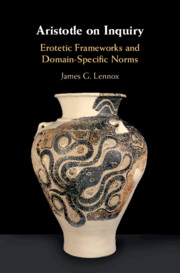Book contents
- Aristotle on Inquiry
- Aristotle on Inquiry
- Copyright page
- Dedication
- Contents
- Figures
- Preface
- Abbreviations
- Introduction
- Part I Erotetic Frameworks and Domain-Specific Norms
- Chapter 1 The Goal of Knowledge and Norms of Inquiry
- Chapter 2 An Erotetic Framework
- Chapter 3 A Discourse on μέθοδος
- Chapter 4 Natural Science
- Part II Norms of Natural Inquiry
- Bibliography
- Index Locorum
- General Index
Chapter 1 - The Goal of Knowledge and Norms of Inquiry
from Part I - Erotetic Frameworks and Domain-Specific Norms
Published online by Cambridge University Press: 07 May 2021
- Aristotle on Inquiry
- Aristotle on Inquiry
- Copyright page
- Dedication
- Contents
- Figures
- Preface
- Abbreviations
- Introduction
- Part I Erotetic Frameworks and Domain-Specific Norms
- Chapter 1 The Goal of Knowledge and Norms of Inquiry
- Chapter 2 An Erotetic Framework
- Chapter 3 A Discourse on μέθοδος
- Chapter 4 Natural Science
- Part II Norms of Natural Inquiry
- Bibliography
- Index Locorum
- General Index
Summary
Chapter Summary. Book i of the Posterior Analytics articulates necessary and sufficient conditions for the achievement of unqualified scientific knowledge, among which is being in possession of first principles of demonstration that themselves are indemonstrable. Book ii, an investigation of inquiries leading to knowledge of essences and causes, describes stages on the way to that goal, each stage looked at from two different perspectives: definitions expressing knowledge of essences and demonstrations expressing knowledge of causes. It has proven difficult to read this second book as a unified discussion, and that has led to a great deal of literature focused almost exclusively on its last chapter, on the assumption that this is where Aristotle provides his answer to the question of how we achieve knowledge of those indemonstrable first principles. But the description of that process in ii.19 is widely viewed as insufficiently robust to explain how first principles arrived at by such a process could possess the epistemic authority Aristotle claims for them.
- Type
- Chapter
- Information
- Aristotle on InquiryErotetic Frameworks and Domain-Specific Norms, pp. 11 - 36Publisher: Cambridge University PressPrint publication year: 2021



